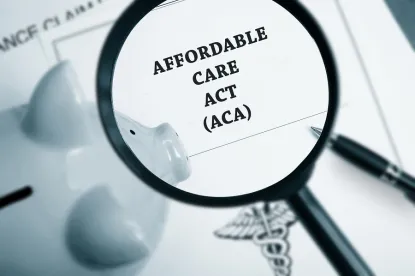On the back of the 2016 United States presidential election results, the health care industry ponders how a Republican president and Congress will transform the business environment. The health care industry has a number of important questions which need to be examined. We take this opportunity to look at key issues, including the meaning of "repeal and replace," the future of Medicare and Medicaid, the rigor of antitrust enforcement, and the viability of insurance exchanges.
While industry observers have speculated about the future, the only thing one can say with authority is that the health care landscape in 2017 and beyond remains highly uncertain.
Following the President-Elect’s campaign refrain to "Repeal Obamacare," the President-Elect and Republican Congressional leaders would indeed find it difficult to repeal the legislation wholesale without creating substantial disruption – both to the approximately 20 million people who gained insurance as a result of the ACA between 2010 and 2016,[1] as well as to the hospitals and insurance companies which have large stakes in the expanded health care coverage the ACA created. Adding to the uncertainty, the Democrats retain a sufficient number of seats in the Senate to filibuster a wholesale Obamacare repeal bill.
Notwithstanding the difficulty of predicting with certainty what will transpire, we believe there are five developments that are likely to occur in the years ahead:
Reductions in Federal Subsidies, Changes to Medicaid Funding and Contraction of Insurance Coverage
Federal subsidies to individuals purchasing health insurance on the ACA health exchanges are likely to be reduced significantly by the next administration and Congress. Such a reduction would cause a dramatic shift in the health care landscape: the Department of Health and Human Services (HHS) estimates that 85% of all health exchange customers receive some sort of subsidy on the marketplace.[2]
Both House Speaker Paul Ryan and nominee for HHS Secretary Tom Price have proposed to replace the subsidies with tax credit schemes based on age.[3] In place of subsidies, for those individuals not covered by their employer, Medicare, or Medicaid, Speaker Ryan's plan proposes a fixed tax credit based on age as a proxy for need.[4] Under this scheme, older Americans would receive more support. Speaker Ryan's plan envisions the credit being large enough to "purchase the typical pre-Obamacare health insurance plan," reflecting the Speaker's general desire to decrease costs of plans by eliminating mandated benefits, such as essential health benefits (EHBs). Representative Price's plan proposes specific figures for the tax credits for each age group, ranging from $900 per year for individuals under age 18 to $3,000 per year for those over age 50.[5]
Some believe the elimination of subsidies in favor of tax credits, however, could result in many consumers falling through the cracks and insurance companies receiving less revenue: The companies will no longer receive the billions of dollars in subsidies the government provided on behalf of qualified individuals. Moreover, many of those individuals do not earn enough income to benefit from a tax credit and therefore would not be able to afford an insurance plan.
Elimination of subsidies and the likely reduction in Medicaid funding will also affect the bottom line for hospitals. The ACA – through the subsidies and expanded Medicaid programs – ensured that a greater number of previously uninsured patients could obtain insurance and pay their hospital bills. In fact, the HHS estimates that the ACA reduced uncompensated care costs by $7.4 billion in 2014.[6] In anticipation of this expanded coverage, the ACA provided for lower Disproportionate Share Hospital (DSH) payments to hospitals. The elimination of subsidized insurance coverage will likely increase the number of uninsured patients at hospitals, and, without an increase in DSH payments, more charity care provided by the hospitals.
Increased State Autonomy in Managing Medicaid Program Design
Speaker Ryan's plan emphasized that states should retain more regulatory control over Medicaid administration.[7] Both the President-Elect and Speaker Ryan support block grants of Medicaid funding to states and greater flexibility for states to determine (and possibly narrow) Medicaid eligibility. It remains unclear whether block grants would reduce overall federal spending on state Medicaid programs.
Under current law, states are permitted to request Section 1115 waivers to modify their provision of Medicaid, which several states opted to do in exchange for expanding their Medicaid programs. Conservative policy favors modifying Medicaid to include prerequisites to coverage, such as cost-sharing measures and work requirements. For example, Governor Mike Pence obtained a Section 1115 waiver to require Medicaid recipients in Indiana to pay premiums if their earnings fall above the federal poverty level. Other states may look to apply for Section 1115 waivers in the near future under what is likely to be a more flexible administration. President-Elect Trump's recent appointment of health care consultant Seema Verma to head the Centers for Medicare & Medicaid Services foreshadows a continued trend toward greater utilization of such waivers: Verma co-designed Indiana's Section 1115 waiver with Governor Pence.
Increased Emphasis on Marketplace Solutions and Consumer Choice
Republicans and the President-Elect have also favored a more consumer-based health care system, where the consumer can make decisions based on his or her needs. Both strongly oppose the individual mandate and support greater expansion of existing health care financing options, such as health savings accounts (HSAs) and health flexible spending accounts (FSAs).
With consumer choice comes the consumer's ability to choose not to buy insurance. The repeal of the individual and employer mandates – another likely action under the next administration – may, absent other action, render insurance companies the victims of adverse selection, where healthy consumers choose not to purchase health insurance, leading to an increase in the proportion of unhealthy consumers covered. Further, Speaker Ryan's plan would prohibit insurance companies from dropping patients simply because they are sick when they renew their plan.[8] President-Elect Trump has stated he also would ban insurance companies from dropping current policyholders just because they are sick; but as for new enrollees, the President-Elect and Speaker Ryan would put those individuals into high-risk pools. These pools could, in theory, provide an insurance option for high-risk individuals, but would require higher premiums and higher federal subsidies: Speaker Ryan's plan promises $25 billion in federal subsidies for such pools.[9]
It is also possible that the new administration will eliminate the federal operation of state exchanges, while still encouraging states to operate their own exchanges. After all, the exchanges are the type of market-based mechanism that the Republican President-Elect and Congress typically support. At the same time, if subsidies are cut, insurance companies may decide to withdraw from the public exchanges, threatening the viability of the individual insurance marketplace platform. Several major insurers have already withdrawn from or scaled back their participation in the exchanges, leaving individual insurance-seekers with as little as one option on the exchange.
Potential Changes in the Shape of the Medicare Program
Speaker Ryan and the Republican Party hope to change the current structure of Medicare to a system based on "premium support." This plan allows private plans to compete with traditional fee-for-service (FFS) Medicare, building on the popularity of already privatized Medicare Advantage plans. Seniors would receive a voucher-like payment toward the plan of their choice – a voucher that may not cover the senior's desired level of care. President-Elect Trump also favors "moderniz[ing] Medicare," although he has not elaborated on a specific plan to do so.[10] In general, plans to change the structure of Medicare remain politically controversial and may not survive in their full proposed form.
Another target of Republican criticism has been the Center for Medicare and Medicaid Innovation (CMMI), which oversees alternative payment and service delivery models that aim to reduce government program expenditures. While some supporters believe CMMI provides a platform for innovation and cost-effective market research, some Republicans claim that the Center oversteps its legislatively authorized role. The new administration could diminish the role of CMMI and decrease its federal funding.
New Rules for the Pharma and Medical Device Sector
Deregulation of pharmaceutical products and medical devices is a likely possibility in 2017 and beyond. President-Elect Trump has stated that his administration will "[r]eform the Food and Drug Administration, to put greater focus on the need of patients for new and innovative medical products."[11] Industry players may face shorter approval periods, which could allow for greater competition and innovation, but may also leave consumers exposed to dangerous products. Nevertheless, investors and lenders may begin to see companies more willing to take risks if the FDA loosens its standards and hastens its process. The 21st Century Cures Act, which passed in the House with overwhelming bipartisan support and is likely to do the same in the Senate, pushes for a modernization of the drug and medical device approval process.[12] The bill appropriates more than $6 billion in federal funds toward high-risk, high-reward biomedical research.
The past year has also seen bipartisan support for lowering prescription drug costs and limiting drug price gouging. A bipartisan bill introduced in September 2016 proposes having drug companies report to HHS any price increases of 10% or more over a 12-month period.[13]
Lastly, the medical device industry may benefit from repeal of the medical device tax imposed by the ACA. H.R. 3762, a wide-sweeping health care reform bill that passed through the House and Senate but was vetoed by President Obama earlier this year, proposed an elimination of the tax, a move also supported by President-Elect Trump.[14]
*Krista White, a law clerk at Proskauer's Health Care practice contributed to this article.
[1] "20 million people have gained health insurance coverage because of the Affordable Care Act, new estimates show," U.S. Dep't of Health & Human Services, http://www.hhs.gov/about/news/2016/03/03/20-million-people-have-gained-health-insurance-coverage-because-affordable-care-act-new-estimates (March 3, 2016).
[2] "More Than 70 Percent of Consumers Can Find Marketplace Plans for Less than $75 Per Month," U.S. Dep't of Health & Human Services, http://www.hhs.gov/about/news/2016/10/24/more-70-percent-consumers-can-find-marketplace-plans-less-75-month.html (October 24, 2016)
[3] "A Better Way: Health Care," Office of the Speaker of the House, http://abetterway.speaker.gov/_assets/pdf/ABetterWay-HealthCare-PolicyPaper.pdf, p. 14 (June 22, 2016); Empowering Patients First Act of 2015, H.R. 2300, 114th Cong. § 36B (2015).
[4] "A Better Way: Health Care," Office of the Speaker of the House, http://abetterway.speaker.gov/_assets/pdf/ABetterWay-HealthCare-PolicyPaper.pdf, p. 14 (June 22, 2016).
[5] Empowering Patients First Act of 2015, H.R. 2300, 114th Cong. § 36B(b)(1) (2015).
[6] "Insurance Expansion, Hospital Uncompensated Care, and the Affordable Care Act," U.S. Dep't of Health & Human Services, https://aspe.hhs.gov/sites/default/files/pdf/139226/ib_UncompensatedCare.pdf(March 23, 2015).
[7] "A Better Way: Health Care," Office of the Speaker of the House, http://abetterway.speaker.gov/_assets/pdf/ABetterWay-HealthCare-PolicyPaper.pdf, p. 12 (June 22, 2016).
[8] "A Better Way: Health Care," Office of the Speaker of the House, http://abetterway.speaker.gov/_assets/pdf/ABetterWay-HealthCare-PolicyPaper.pdf, p. 20 (June 22, 2016).
[9] "A Better Way: Health Care," Office of the Speaker of the House, http://abetterway.speaker.gov/_assets/pdf/ABetterWay-HealthCare-PolicyPaper.pdf, p. 21 (June 22, 2016); Karen Pollitz, "High-Risk Pools For Uninsurable Individuals," Kaiser Family Foundation, http://kff.org/health-reform/issue-brief/high-risk-pools-for-uninsurable-individuals/ (August 1, 2016).
[10] Healthcare, President Elect Donald Trump, https://www.greatagain.gov/policy/healthcare.html.
[11] Healthcare, President Elect Donald Trump, https://www.greatagain.gov/policy/healthcare.html.
[12] 2 1st Century Cures Act, H.R. 6, 114th Cong. (2015).
[13] H.R. 6043, Fair Accountability and Innovative Research Drug Pricing Act of 2016, 114th Congress, 2nd Session (2016)
[14] H.R. 3762, 114th Cong. (2015).



 />i
/>i

